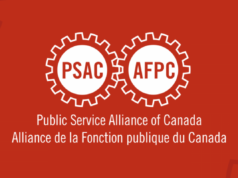On February 17, 2016, members of the CIU National Executive, Sister Lisa Addario (PSACLegal Officer), Brother Murray Star (EO Representative), Brother Bruno Loranger (Labour Relations Officer) and the employer met to discuss accommodations and issues related to Appendix G-1.
In CIU’s update of January 7, we provided the following list of duties as being suitable for accommodated members at level:
- Electronic Data Interchange (EDI)
- Alternate Inspection Services (AIS) Risking
- NEXUS Enrolment Centres
- Inland Enforcement Officer (no road duty)
- Commercial (back office)
- Telephone Reporting Centres
- Hearing Advisors
- Postal Operations
- National Targeting Centre
We also indicated that CBSA was looking at the suitability of other positions for accommodated members, namely those of Instructor duties at training centres and desk duties for Intelligence Officers and Investigators.
CBSA has indicated that it will consider accommodating members in these positions. It should be pointed out that several members are already being accommodated at Rigaud. The employer has also stated that it may want to place some of our members there whose positions will be (or have been) eliminated with the closure of firearm training facilities in Prince Edward Island and at Slack Road.
Regardless of the list of duties deemed suitable, it bears repeating that members who are already in accommodated positions that do not involve face to face enforcement interactions with clients will remain in those positions.
While CBSA is willing to consider accommodating desk duties for Intelligence Officers and Investigators (in addition to Rigaud and the other duties listed above), it has indicated that all must be considered on a case by case basis. For some duties, several positions may be available while for others (e.g. Inland Enforcement Officer – no road duty), the number may be limited. CBSA further clarified that it needs to take into account the viability of suggested accommodations and must also meet financial, regional and operational requirements. Obviously, members who are placed in these positions must also have the necessary skills and knowledge (e.g. language, specialized training) to do the job.
The employer believes it has made great progress in accommodating those 108 officers who had been performing face to face enforcement but could not pass the DFC training. However, it also acknowledges that there will be other officers similarly situated who, in the future, will require accommodation.
It is the employer’s position that if a member is registered for DFC and is “trainable”, that member can remain in his/her position beyond March 31, 2016. The employer defined “trainable” as a member who either: a) has been scheduled to go to DFC; b) has failed DFC but is being provided with remedial support from the employer; or c) is in the process of obtaining their CAT III.
The employer agreed to remove the requirement for a CAT III medical for members working in postal operations.
CIU also raised concerns about CBSA requiring members to go to a Health Canada doctor for their CAT III. CIU reminded the employer that there is no legal requirement for our members to see the company Doctor.
If a member has failed the MMPI twice, CIU encourages that member to speak with a CIU Labour Relations Officer to determine next steps.
Members who do not want to attend DFC training but who plan to retire in the short term should discuss this with their Branch President. Together, they can approach the employer to discuss possible retirement dates/interim solutions. Again, note that this will be considered on a case by case basis. Note also that the shorter the period requested, the more likely it is to be approved.
The employer repeated that it had no intention of demoting accommodated officers or lowering their pay and added that such rumours were “science fiction”. They also agreed to speak with regional management team members and CIU Branch Presidents in regions where such rumours had been reported. Both parties acknowledged that where management included the union in discussions with affected members, the process had gone smoothly. CIU reminded the employer that it was to its benefit to have the union involved. The employer agreed to make it clear to its affected employees that the union was available and on hand to participate in such meetings.
CIU again confirmed with the employer the principles upon which it agreed to participate in these discussions: that members who were already in accommodated positions would continue in those positions; members would be accommodated at level, with no loss of salary or benefits; and members would be offered meaningful work.




